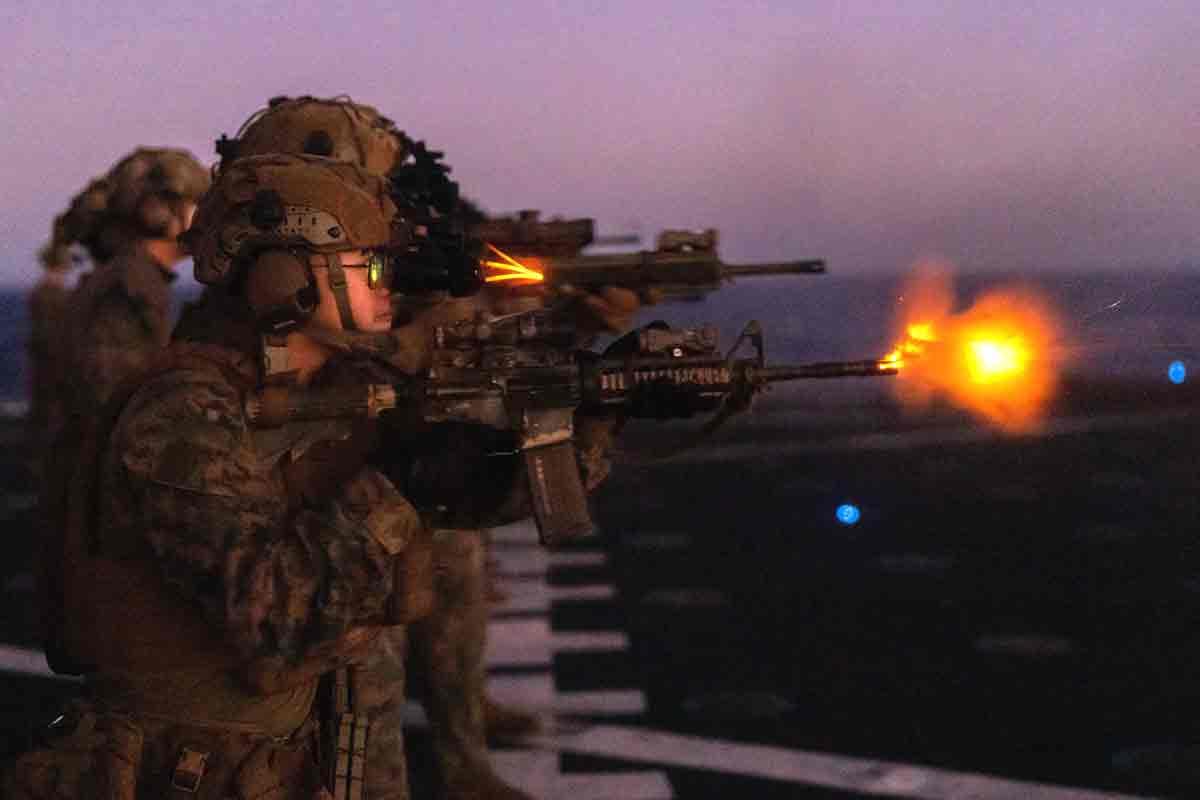
The Pentagon has officially extended the deployment of the 26th Marine Expeditionary Unit and a Navy amphibious ready group headed by the USS Bataan in the Mediterranean Sea amid growing regional turmoil, according to a defense official.
The extension was being mulled by the department following a U.S. military buildup late last year aimed at stopping the Israel-Hamas War from spilling over. A Navy spokesperson said Wednesday that Defense Secretary Lloyd Austin directed the ships and Marines to remain in the region.
The 26th MEU, a special operations-capable Marine Corps unit, and the Bataan group originally deployed in July to deter Iranian aggression against commercial shipping vessels near the Persian Gulf. Now, after already being extended once before, the units will stay deployed as the Pentagon looks to keep Marines in the region as violence has escalated, with U.S. forces attacked by Iran-backed proxies more than 160 times in the last few months.
Read Next: Gen Z, Are You Listening? Super Bowl Eyed by Military Services Amid Recruiting Crisis
The defense official told Military.com on Friday that “the Bataan ARG and 26th MEU [have] been extended in the” U.S. European Command area of operations, which includes the Mediterranean. On the far east, the sea also borders the Gaza Strip, Israel, Lebanon and Syria, where violence has spiked since the war began in October.
Shortly after the October attack by Hamas on Israel, which plummeted the region into uncertainty for the last four months, the unit cut an exercise in Kuwait short to head to the “waters off of Israel” in an effort to deter Iran-backed militias from taking advantage of the turmoil.
Since that time, bases in the region have endured a barrage of attacks. As of last week, bases throughout Iraq and Syria have suffered at least 165 attacks since Oct. 17, leaving at least 80 injured — a total that doesn’t include the deaths and injuries from the attack on an outpost in Jordan in which three service members were killed and more than 40 were injured.
Meanwhile, in the Red Sea, Navy ships have been dealing with Houthi-launched drones and missiles since mid-October. To date, the destroyers Gravely, Thomas Hudner, Mason, Laboon and Carney have downed more than 50 drones and around 20 missiles launched into the Red Sea. At least one of those missiles got dangerously close — within a mile — to the Gravely.
The 26th MEU is part of the Bataan Amphibious Ready Group, or ARG, a three-ship unit meant to respond to emerging threats around the world; their deployments are typically six to seven months, which means this new extension will keep the unit out longer than usual. Roughly 3,000 Marines and sailors are onboard.
“We can confirm that the USS Bataan ARG/MEU remains on station in the Mediterranean Sea at the direction of the secretary of defense,” Lt. Cody Keim, a spokesperson for U.S. Naval Forces Europe-Africa, told Military.com on Wednesday. “The U.S. Navy and U.S. Marine Corps are inherently flexible, giving our nation and allies deterrence and defense options to conduct operations whenever and wherever we choose.”
Military.com reached out to Pentagon officials for confirmation but was told only that there were “no changes to announce on force posture.”
Keim declined to say how long the unit would remain in the region. When asked whether the families of the Marines and sailors aboard the Bataan ARG have been notified that the deployment has been extended, he said that “once the secretary of defense made the decision, the BAT ARG/MEU crew was notified and official family notifications were made.”
The 26th MEU is the only special operations-capable Marine Air-Ground Task Force in the fleet and was designated as such — the first in more than a decade for the Corps — before it deployed last year. It is capable of conducting port seizures, noncombatant evacuations and embassy support.
Military.com previously reported that the Pentagon was considering this extension for the Marines and sailors aboard the Bataan group. Lt. Gen. Karsten Heckl, who heads the Marine Corps’ modernization efforts, told Military.com late last month that the unit was then “looking at yet another extension” because of the unprepared state of the Navy’s amphibious ship fleet.
Heckl said that Marine expeditionary forces have been prevented from deploying on time because the amphibious ships they ride on are not ready to set sail due to a number of factors, including maintenance issues.
For example, the USS Boxer, an amphibious warship that will be the heart of the next Marine deployment, has been struggling with maintenance issues for months. The ship spent more than a year at the pier, despite having just completed a two-year overhaul. Then, when it finally did get underway, it belched black smoke outside San Diego harbor.
Two weeks ago, Navy officials told Military.com that the ship, which was scheduled to deploy in November, still needs “additional advanced training” before it is fully ready to deploy.
Several top Marine leaders have said that these fleet-wide maintenance issues have caused the Corps to miss out on key operations, like the evacuation of Americans in Sudan, over at least the last two years. Now, they appear to be affecting the 26th MEU’s ability to get replaced.
“When you extend an ARG like that, it has a lot of ramifications, both material-wise and manpower,” Heckl said last month after Military.com reported that the extension was being considered. “Material-wise, that ship is now staying underway longer than it had been planned and is probably impacting some maintenance avail[ability] that was scheduled.
“And then the manpower — maintaining good faith and trust with our Marines,” he added. “What happens to those Marines that had an end-of-active-service date, and now they’re getting essentially involuntarily extended?”
In response to accusations of not being prepared to deploy on time, the Navy told Military.com that it was continuing “to maximize readiness and [is] able to fight and prevail when and wherever called upon.”









